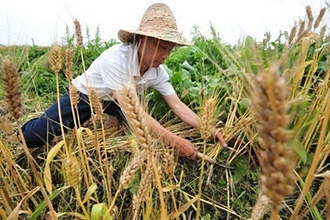
|
 |
 |
 Editorials | Issues | June 2008 Editorials | Issues | June 2008  
Latin Americans Unhappy at Food Summit Conclusions
 Phil Stewart - Reuters Phil Stewart - Reuters
go to original


| | A farmer harvests wheat in China's quake-stricken Sichuan province. World leaders vowed Thursday to halve global hunger by 2015 and take "urgent" action over the global food crisis, but only after going into overtime at a fractious summit in Rome. (AFP/Frederic J. Brown) | | |
Rome - A group of Latin American countries accused a U.N. food summit on Thursday of incorrectly diagnosing the root causes of a crisis threatening millions with starvation, but stopped short of torpedoing the event.

Cuba, Venezuela and Argentina were the strongest critics of a final declaration approved by the summit of 183 countries. It was passed without their support only after hours of protests by delegates in a debate watched by the world's media.

Each voiced concern that the Rome conference did not take account of developing countries' views.

"Texts such as these ... frankly neglect the vital needs of those who suffer from hunger," Cuban delegate Orlando Requeijo Gual said, criticising a U.S. embargo on the Caribbean island.

He complained about "sinister strategies of using grain for fuel", in a reference to the U.S. corn-based biofuel ethanol, whose production critics say is growing at the expense of food.

Cuba also hit out at the "blockade and the aggressions of the United States", saying it had implications on food supplies.

The government of grain and beef exporter Argentina objected to criticism in the declaration of export curbs such as those it had imposed to shield consumers from food inflation, measures that have angered its powerful farm sector.

"When one starts on the basis of a mistaken diagnosis no appropriate remedy can be found. This is what is the matter with this declaration," said Argentine delegate Luis Niscovolos.

Economic heavyweights Brazil and Mexico stood on the sidelines of the debate, interpreted as solidarity with regional allies.

A member of the Venezuelan delegation said developing countries needed to be able to shield their markets from free trade when necessary, including when facing a dangerous influx of foreign imports that could devastate local industry.

Experts consider the failure of many poor nations to grow enough of their own food to be a cause of the food crisis.

Venezuela's ambassador to the U.N. Food and Agriculture Organisation, which hosted the event, questioned why the poor countries in Africa and elsewhere supported the declaration.

"I ask ... will this do anything to end hunger?" said Venezuela's Gladys Francisca Urbaneja Duran.

(Additional reporting by Laura MacInnis and Alister Doyle; editing by Andrew Dobbie) | 
 | |
 |



